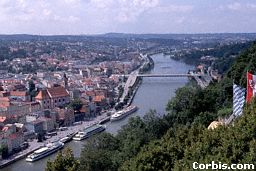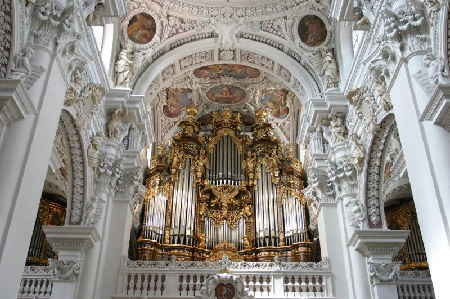パッサウ
- 三川の合流点
 1762年2月、ミュンヘンから戻ったモーツァルト一家は、約半年をザルツブルクで過ごしたのち、9月18日、ウィーンに向けて出発しました。
1762年2月、ミュンヘンから戻ったモーツァルト一家は、約半年をザルツブルクで過ごしたのち、9月18日、ウィーンに向けて出発しました。
ザルツブルクからパッサウまでは馬車でいきました。パッサウはバイエルン州、ドイツとオーストリアの国境に位置する小さな街です。ドナウ川、イン川、イルツ川の3つが合流する街で、大聖堂でも知られています。
現在は、ドイツ・バイエルン州の州都ミュンヘンから東に約180キロメートル、オーストリアとの国境に接する、人口およそ5万1千人の都市です。
13世紀に、ザルツブルクと同じように、領主司教領となり、領主司教時代はバイエルン選帝候国に編入される19世紀の初めまで続きました。
- 大聖堂
- パッサウの大聖堂は格式が高く、ウィーンのシュテファン大聖堂の上席の地位にありました。
また、パッサウの大聖堂は、最大級のオルガンでも知られます。

1770年代初めに、パッサウの大聖堂を訪れたチャール・バーニー(Charles Burney)は、次のように報告しています。
"Passau is a large imperial city. In the cathedral, which is a very beautiful modern building, of the Corinthian order,there is a very magnificent organ, to look at.The case is finely carved and gilt,and the pipes are highly polished: it is divided into two columns of large pipes, one on each side, and has a complete little organ in the middle, which joins them together, and saves the west window: it is what builders call a thirty-two foot organ. M. Snetzler, when it was last repaired, made some of the front pipes, but there is little variety in the inside : he likewise made the vox humana, and octave dulciana, in the little organ, which are the two best solo stops that the instrument contains. On each side of the choir, in this church, there is likewise a small organ, with the pipes so highly burnished, that I cannot help supposing them to be of silver; indeed the person who shewed me the great one, assured me that they were silver pipes; but as he likewise would have persuaded me that the front of the great organ was of that metal, in which I was certain he was mistaken, I cannot depend on his word."